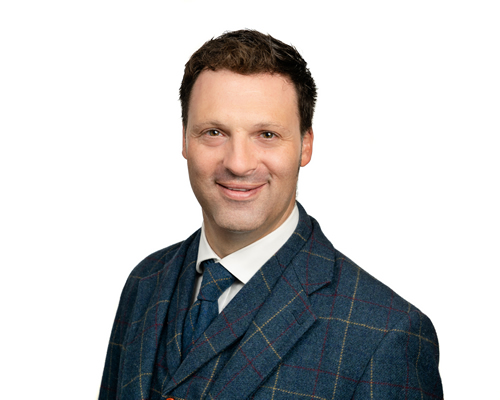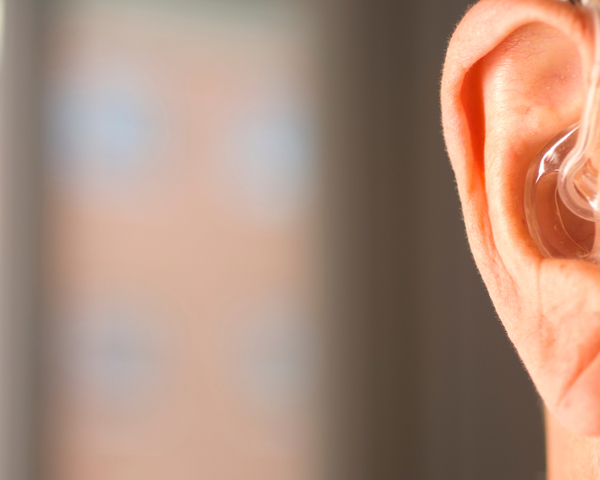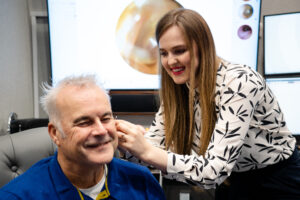Hearing aids are powerful tools for hearing loss treatment, but very few people who need them use them. According to UK charity HearingLink, around 7 million people could benefit from hearing aids, but only 2 million have them.
One of our most frequently asked questions is ‘When do I need a hearing aid?’ and if you’ve started to wonder if you’re in that group of 5 million individuals who could see huge benefits from getting a hearing aid, read on.
You may be asking this question because you’re reluctant to get hearing aids because of the perceived stigma (more on this later), but we believe this is a minor trade off for the huge quality of life improvements you’ll experience. Embracing hearing aids can open up a world of better hearing and well-being.
This blog contains all the details you need to help you find out whether you would benefit from a hearing aid.
Key Takeaways
- There are many Symptoms Indicating Need for Hearing Aids – Common signs include partial deafness, muffled sounds, and difficulty hearing. Additionally, symptoms like persistent tinnitus, challenges in understanding conversations, and trouble locating sound sources may also indicate the need for hearing aids.
- The need for hearing aids is Prevalent across all ages – Hearing aids benefit individuals with hearing loss, regardless of age. Children, teens, adults, and the elderly can all experience improved hearing and quality of life.
- Hearing aids Prevent Cognitive Decline – The misconception that hearing aids are only for the elderly hinders younger people from seeking help. However, hearing aids are effective for anyone experiencing hearing loss. Untreated hearing loss increases the risk of cognitive decline and dementia. Hearing aids help by reducing the brain’s effort to process sound, thereby lowering cognitive load.
You may need a hearing aid if you have the following symptoms:
Partial deafness, muffled sounds or real difficulty hearing are all common signs that you may need a hearing aid, but sometimes, things may not be so obvious. There are lots of smaller issues almost everyone misses, which means it could be time you visit an audiologist.
1. You Have Ringing in Your Ears
Persistent ringing in your ears, otherwise known as tinnitus, is a widely-experienced medical condition that affects as many as 15% of people. Tinnitus has many causes, but hearing damage resulting in hearing loss is often the primary culprit. When hearing is damaged, the cells in the ear that pick up sounds die. In the absence of sound from these cells, the brain invents its own — the ringing in your ears. Dead cells mean an inability to hear through them. The fewer cells you have available for hearing, the more profound your tinnitus and hearing loss will be.
Related Reading:
2. You Can Hear People, but You Can’t Understand Them
Mild hearing loss is staggeringly common. Around 1 in 6 people have hearing loss in the UK, with the number rising as we age. Most of the time, we don’t pay attention to this hearing loss. Many people will go untreated for over 10 years. The most common sign of mild hearing loss is hearing people, but not being able to understand everything they say. You hear the noise, but it’s slightly unintelligible like they’re speech is too fast, or they’re talking in a different language, or they’re a little bit too far away. You’ll often find you are asking people to repeat themselves a lot.
3. You’ve Suffered a Head Injury or Accident
Sudden and violent head injuries, such as those resulting from car accidents or blows to the head, can result in hearing loss. Internal trauma can damage auditory pathways to the brain, which affects the way sound is received. The brain can be good at compensating for this kind of injury, but a hearing test can help you understand if a head injury has resulted in hearing loss.
4. You Can’t Work out Where Sounds Are Coming From
Depending on air conditions, sound travels through the air at a specific rate. The result is that, unless you’re standing looking directly at the origin of the sound, it will reach your ears at slightly different times. In a fascinating ability of the subconscious, our brain can use an infinitesimally small time-delay to figure out the direction a sound came from. However, this process often does not work if you have hearing loss. People with healthy and normal hearing will have no trouble picking up on where the sound originated from. People with hearing loss may still be able to do this as well. However, if you’re struggling to figure out the direction of a sound, it may be a strong indicator you need a hearing aid.
What level of hearing loss requires a hearing aid? Dispelling the Stigma
We’re often asked about the level of hearing that requires a hearing aid but the truth is – Hearing aids are not just for deaf people, or those with acute or severe hearing loss. Hearing aids are devices that can improve the quality of life for those with even a mild hearing loss diagnosis. Yet so many shy away from hearing aids and the amazing results they can provide.
The stigma around hearing aids relates to being senile and decrepit. The idea is that hearing aids are for older people, and you aren’t old, so why would you need one?
But let’s stop right there.
Yes, hearing aids have a higher rate of use in the elderly population. But that’s only because hearing loss is a problem seen in significantly higher proportions of older people than younger generations. 70% of people over 70 have hearing loss.
It’s just a natural part of ageing. This is true of so many other diseases and medical conditions. Conditions like diabetes, high blood pressure and poor eye-sight are all more common in people over 60. But individuals of all ages seek treatment for these conditions.
Hearing loss is prevalent across all age groups. 15% of young people between the age of 6 and 19 have some form of diagnosable hearing loss. This hearing loss can be supported by hearing aids, but this age group is much less likely to get help because of their perception of hearing aids and who they are designed for.
Related Reading: Why Young people using headphones are experiencing hearing loss
To ensure the millions of people who need help get the treatment they need, we need to dispel the stigma that surrounds hearing aids.
Whether you are 8 or 80, having a hearing aid does not mean you’re “past it” — or anywhere close to being senile or geriatric. It simply means you have a health condition, and that health condition needs treating.
Hearing aids are the most effective form of hearing loss treatment, no matter what age you are.
It’s also important to note that hearing aids aren’t the bulky devices they used to be. Hearing aid technology has come a long way in recent years. In many cases, hearing aids are now very subtle, and often unnoticeable. Invisible hearing aids even exist, which are fitted inside the ear and are invisible during everyday social interaction. If you’re conscious of having an obvious hearing aid, don’t let it stop you getting the treatment you need.
What do our audiologists say?
“Hearing aids are not just for the elderly; they can greatly benefit individuals of all ages who experience hearing loss. These devices enhance not only hearing but also overall quality of life by improving communication, reducing cognitive strain, and even helping with mental health issues such as anxiety and depression. Modern hearing aids are sophisticated devices that adapt to various environments, making them essential tools for anyone with hearing impairments,” says Lindsay Fletcher, Company Director & Consultant Audiologist
So who really needs hearing aids?
Do you belong to the following groups of people?
1. Those with Diagnosed Hearing Loss
- Mild to Severe Hearing Loss: Suitable for individuals with any level of hearing impairment.
- Various Types of Hearing Loss: Beneficial for conductive, sensorineural, or mixed hearing loss.
2. Those with hearing loss at any age
- Children and Teens: Young individuals with congenital or acquired hearing loss.
- Adults: People in their prime working years facing hearing difficulties.
- Elderly: Seniors with age-related hearing decline.
3. Those with Specific Needs and Conditions
- Tinnitus Sufferers: Hearing aids can help manage symptoms like ringing in the ears.
- Cognitive Health: People at risk of cognitive decline due to untreated hearing loss.
4. Those Who Suffer in Social Situations
- Social and Professional Communication: Individuals struggling in conversations or at work due to hearing issues.
- Mental Health: Improved mood, and reduced anxiety, and depression through better hearing.
Modern hearing aids are versatile tools designed to cater to a wide range of needs, improving overall quality of life for people of all ages. Get in contact with our experienced audiologists are Regain Hearing and we can provide valuable insights and solutions tailored to your specific hearing challenges.
Will Hearing Aids Work for Me?
Yes, it’s very likely hearing aids will enable you to hear better. Roughly 95% of people with hearing loss will see a partial or complete recovery of hearing function upon being introduced to hearing aids. The technology behind hearing aids means it can be adapted to support many types of hearing loss and has been shown to give a major boost to the quality of life for millions.
But there is a caveat to the success of hearing aids.
Your particular type of hearing loss will need treatment using a specific type of hearing aid device, set to particular settings by a professional audiologist. It’s not a one-size-fits-all system. The successful results of hearing aid treatment for hearing loss depends on getting your treatment right. You must find hearing aid devices that can help you.
You cannot just buy any old hearing aids and expect them to work.
A hearing test is vital to successful hearing loss treatment. When you book a hearing test with an audiologist clinic like Regain Hearing, we’ll analyse your hearing ability through a range of tests designed to find out exactly how your ears are affected by hearing loss. From mild to severe hearing loss, a proper test will help you identify the cause of your hearing loss, and allow a professional audiologist to advise you on the best possible hearing aid to treat your unique problem.
Related Reading: How often should I have a hearing test?
Time to treat your hearing loss and begin your journey to a better quality of life? Get in touch with our private ear clinic today.
Do I need a hearing aid in both ears?
The need for two hearing aids depends entirely on the cause of your hearing loss. If caused by trauma to the ear, through an injury or noise-induced hearing loss, you may find you only need one hearing aid. This will allow the affected ear to regain the hearing quality available to the non-affected ear.
Basically, the single hearing aid will strike a balance.
However, hearing loss is usually caused by bilateral problems related to damage in both ears. This loss may be due to age, health conditions or disorders, or damage to both ears at the same time. If both ears are affected, you’ll need two hearing aids. While one hearing aid would allow you to hear much better out of a single ear, you’ll still have trouble with the other. The problem becomes things like background noise that cannot be filtered by the ear that does not have a hearing aid. Despite having what may be considered perfect hearing in the ear with a hearing aid, the ear without a hearing aid will essentially act as an anchor for your good hearing. The signals it gets will confuse your brain and stop it from registering sensory information properly. It will also mean you cannot use your hearing to assess the direction of noise, as mentioned earlier in this blog.
The best course of treatment for hearing loss in both ears is to get hearing aids for both ears. Wearing two hearing aids helps you achieve the full range of hearing you need to live the way you want to. With two hearing aids, you can happily hold conversations, understand where noise is coming from, and support optimum ear health.
The Risk of Cognitive Decline
Before we open this discussion, it’s important to note this information is not designed to scare you. The side-effects of untreated hearing loss can be worrying, but you must be aware of the risk factors so you can make an informed decision. For some people, getting hearing aids is a big step. You have to be confident this is the right choice for you.
So what happens if you don’t get hearing aid treatment for hearing loss?
Hearing loss does not get worse on its own. It needs a stimulus. This may be the ageing process, or it may be further damage to the ear. People could argue that since their hearing loss is currently manageable, they don’t need hearing aids yet.
But this might not be a good idea.
Modern research is starting to point towards strong evidence that hearing loss and the emergence of cognitive decline and dementia are linked. Data from dementia patients shows us the risk of developing the disease rises by 100% if mild hearing loss is also present. In the case of moderate hearing loss, that figure is 200%. If we continue to severe hearing loss, the risk factor of dementia compared to somebody without hearing loss is 500% higher.
Hearing loss is a huge risk factor in developing dementia. In fact, of all potential risk factors leading to it, hearing loss is the most common.
We still don’t fully understand why this is the case, but several convincing theories exist. The most widely-supported theory comes down to cognitive load. The idea is simple: our minds are only able to cope with so much information. As we age, the volume of information we can process decreases with natural cognitive decline. While our cognitive abilities are slowly decreasing, the presence of hearing loss puts more pressure on our brain. The brain is striving to achieve its former sensory ability with diminished function, which means it is working much harder all the time to hear. This effectively causes cognitive overload and also diverts resources away from other areas of the brain as it struggles to do something as basic as hearing.
Fill up a jet plane with fuel and it’ll fly for hours. Load it with passengers and luggage and its flight time will decrease with weight that is literally dragging it down. Your brain is the jet plane and natural cognitive decline is the fuel available. Hearing loss is the passengers and luggage. Hearing loss is effectively draining the fuel your brain needs to stave off more rapid cognitive decline and the onset of dementia.
So what’s the answer?
We can’t give you more fuel, but we can lower the drag. Hearing aids make it easier for your brain to interpret sound. They enhance the sound waves entering the ear and help your inner-ear receive information. By making it less difficult for your ear to hear noise and filter out information, we can reduce the cognitive load on your brain.
Much research is still required to build a full picture of the way dementia and hearing loss are clearly linked. However, given that care of your hearing loss could also slow the effects of cognitive decline and delay the onset of dementia, for many, hearing aids will be a worthwhile gamble.
Hearing aids can also help treat a secondary problem relating to cognitive decline, which is social isolation. Nearly two out of three people with hearing loss claim they’ve felt isolated, with many individuals distancing themselves from others because conversations are difficult, making social interaction challenging and sometimes embarrassing. The anxiety and stress of trying to communicate with hearing loss are enough to create distance and the breakdown of social relationships.
When you can’t enjoy an evening out with friends because you can’t hear or talk to them, you simply avoid the situation.
Social isolation has major implications for mental health and wellbeing, but it also presents a risk factor for dementia. Loneliness and social distancing have been linked to higher chances of cognitive decline. The prevailing theory is social interaction creates mental activity that benefits brain health. Without it, cognitive abilities can decline. Essentially, it’s like building muscle at the gym. If you stop exercising, your strength decreases. If you stop being mentally stimulated by social engagements, your cognitive ability suffers as a result.
Hearing aids enable better communication. They stop background noise drowning out words, help you focus, and allow you to hear everything being said. Hearing aids give people the ability to join the conversation, be part of social experiences, and offer the confidence you need to be a part of the world again.
Other Frequently Asked Questions?
Do I Need a Hearing Aid for Mild Hearing Loss?
Yes, even mild hearing loss can benefit from hearing aids. They can enhance sound clarity and improve communication in various environments, making everyday interactions easier.
Does Moderate Hearing Loss Require Hearing Aids?
Yes, moderate hearing loss typically requires hearing aids. They help to amplify sounds and improve understanding, significantly enhancing the quality of life and social interactions.
Can Hearing Aids Help Severe Hearing Loss?
Yes, hearing aids can significantly aid those with severe hearing loss. Advanced hearing aids are designed to amplify sound more powerfully and improve overall hearing ability.
Do I Need a Hearing Aid for Tinnitus?
Hearing aids can be beneficial for tinnitus sufferers. They help by amplifying external sounds, which can mask the tinnitus and provide relief from the constant ringing or buzzing.
Which Hearing Aid is Right for Me?
The right hearing aid depends on your specific hearing needs, lifestyle, and preferences. An audiologist can help determine the best option based on the severity of your hearing loss and your daily activities. Options range from in-the-ear to behind-the-ear models with various technological features.
Consulting with an audiologist is the best way to find a hearing aid tailored to your needs. Or read our blog on the different types of hearing aids here: how do hearing aids work?Concerned about the risks to your health caused by hearing loss? Our private ear clinic can help! Located in Kent, Essex and London, we can schedule you in for a hearing test, analyse your hearing loss, and support you with the treatment you need.





 “Hearing aids are not just for the elderly; they can greatly benefit individuals of all ages who experience hearing loss. These devices enhance not only hearing but also overall quality of life by improving communication, reducing cognitive strain, and even helping with mental health issues such as anxiety and depression. Modern hearing aids are sophisticated devices that adapt to various environments, making them essential tools for anyone with hearing impairments,” says
“Hearing aids are not just for the elderly; they can greatly benefit individuals of all ages who experience hearing loss. These devices enhance not only hearing but also overall quality of life by improving communication, reducing cognitive strain, and even helping with mental health issues such as anxiety and depression. Modern hearing aids are sophisticated devices that adapt to various environments, making them essential tools for anyone with hearing impairments,” says 




